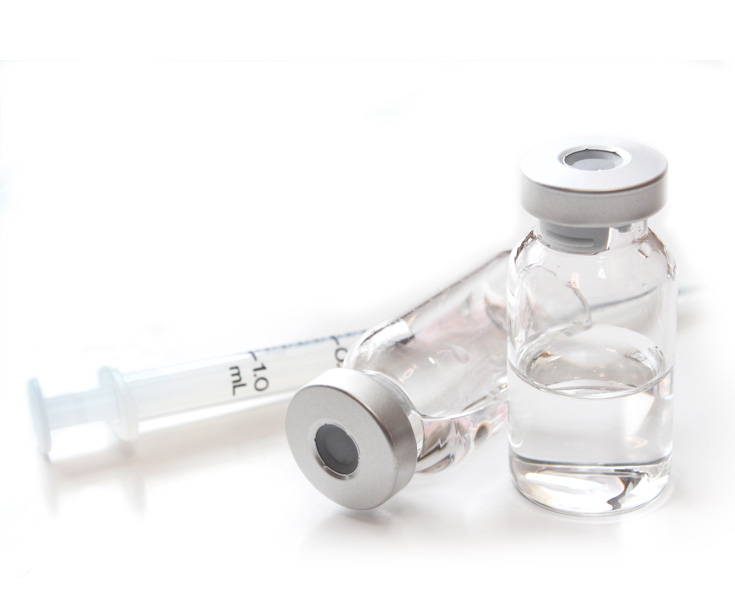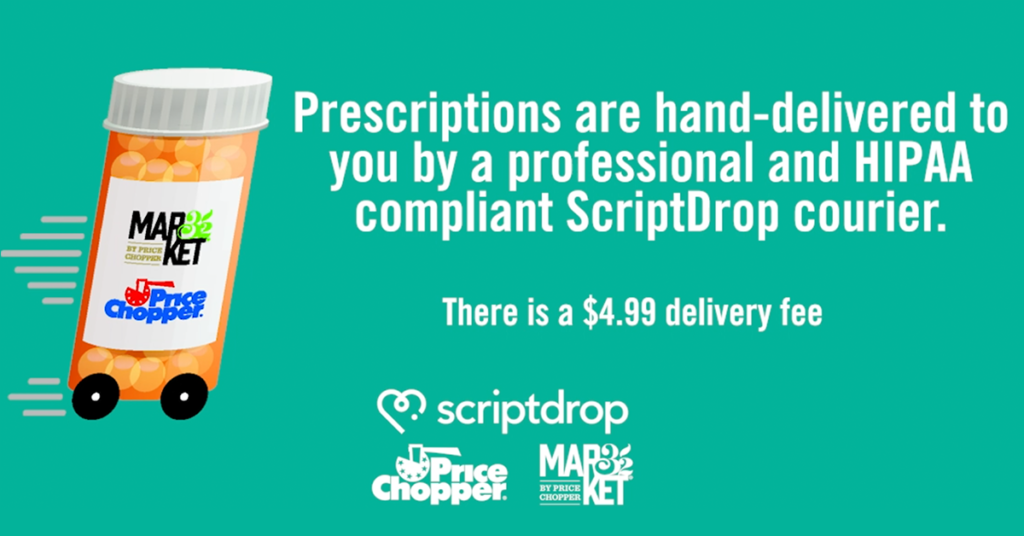
Get Your Pet Meds at Price Chopper
At Price Chopper/Market 32, we are passionate about supplying our customers with everything they need to keep themselves and their families healthy. Of course, pets are always included in that! We strive to provide the resources they need to live happy. Did you know you can pick up your pet medications from our pharmacies? It’s true! We offer affordable prices and an easy pick-up process at our in-store pharmacies.
We offer top brands like Bavecto, Frontline, and Seresto for fighting fleas & ticks, Bravecto requires a healthcare provider prescription. New, transferred, and authorized refills are included as ordered by a prescriber. Also, your pet is covered with a number of prescription meds for various ailments: Carprofen for arthritis/joint pain in cats and dogs, Heartgard Plus for Heartworm in dogs, eye meds such as Latanoprost, Dorzolamide, and Diclofenac, Levothyroxine for thyroid in dogs, and Vetsulin for diabetes in dogs and cats. For more information please visit our website.
Can’t pick up? Medications can also be delivered via ScriptDrop. Whether it’s to your home, office, or assisted living facility, prescriptions can be hand-delivered by a professional and HIPAA compliant ScriptDrop courier. Click here to find delivery options and participating locations near you!
We believe all good patients deserve a nice, healthy treat so check out our selection of pet treats, sure to make your furry friend smile!
Shop Pet Treats

Why You Should Get Your Flu Shot Every Year
by Angelique Harris
With COVID-19 still maintaining its hold on the world’s health systems, it is important to not disregard the seasonal influenza virus. With flu season rapidly approaching there are many reasons why it is more vital than ever to get vaccinated. Not only will your vaccination contribute to herd immunity protecting those that are unable to get vaccinated, but it also helps reduce flu-related hospitalizations, allowing health care workers to continue to focus on treating patients with COVID-19 and conserving medical resources.
Influenza is very commonly overlooked, and many are unaware of the potential seriousness that it holds as it can be deadly. Approximately, 35.5 million Americans contracted the flu during the 2018-2019 flu season and from those 34,200 individuals died from the illness.1 During the 2019-2020, the flu vaccine prevented an estimated 7.5 million influenza cases, 105,000 associated hospitalizations and 6,300 flu-related deaths. A study conducted in 2014, published in the Journal of Infectious Diseases reported that the flu vaccine prevented pediatric intensive care unit (PICU) admission by 74% from 2010-2012.2
How do flu vaccines work? The influenza virus infects our body by attacking our own cells and modifying the DNA within our cells to create more virus. The flu vaccine is formulated every year in time for flu season. They are made up from inactivated strains of the influenza virus.2 Once vaccinated, the immune system recognizes the foreign invader and quickly starts up the immune response to create antibodies which are cells within our body that can target the virus and extinguish it without affecting our own cells. Since the pathogen has been modified or is already dead, the immune system is able to create antibodies that the body will then use if exposed to a live virus. Therefore, you cannot get the flu from receiving the flu vaccine since it does not have the ability to infect the cells. One important thing to note is that the antibodies generally take a week or more to develop to achieve the full protection offered from the vaccine.3
Why do I need a new vaccine every year? The influenza virus is a master of disguise. Every year it changes its appearance to one that our bodies are not familiar with. With this change in appearance, if you had not gotten vaccinated and you were exposed to the virus, the body would then have to fight harder to prevent the spread of the virus as well as make the antibodies to fight off the infection. During this time, the body has other methods to prevent the spread of infection such as increasing internal body temperature (fever) pulling protein from the body’s muscles (muscle aches), along with washing the germs from the nasal and respiratory system (runny nose, coughing).4
Getting vaccinated can do more than protect yourself from the flu. Herd immunity is what occurs when a vast majority of the population is vaccinated thus making it difficult for the virus to spread. This type of immunity is beneficial to young infants and immunocompromised individuals to have some form of protection.5 People with chronic medical conditions such as heart disease and asthma are at high risk for serious complications leading to possible life-threatening pneumonia.
Getting the flu vaccine is a small act that can have a big impact on protecting those around you and the community.
Sources
- What are the benefits of flu vaccination? [Internet]. Center for Disease Control, National Center for Immunization and Respiratory Diseases. 2021 8 June. [cited 2021 Aug 10]. Available from: https://www.cdc.gov/flu/prevent/vaccine-benefits.htm
- How the Immune System Protects You From Infection [Internet]. Pfizer Pharmaceuticals. [cited 2021 Aug 10]. Available from: https://www.pfizer.com/news/hot-topics/how_the_immune_system_protects_you_from_infection
- Haelle, Tara. Why You Need the Flu Shot Every Year. [Internet]. The New York Times. 2017 Dec 1. [cited 2021 Aug 10]. Available from: https://www.nytimes.com/2017/12/12/smarter-living/why-you-need-the-flu-shot-every-year.html
- How Your Body Fights Off Cold and Flu [Internet]. Vicks. Proctor & Gamble. [cited 2021 Aug 10]. Available from: https://www.vicks.com.au/en-au/science-of-healing/understanding-types-of-illness/how-your-body-fights-off-cold-and-flu
- Franco, Cheryl. Getting the Flu (Influenza) Vaccine: Why It’s Important [Internet]. Children’s Hospital of Los Angeles. [cited 2021 Aug 10]. Available from: https://www.chla.org/blog/rn-remedies/getting-the-flu-influenza-vaccine-why-it-s-important

How the Flu Vaccine Can Help with Severe Symptoms of COVID-19
by Angelique Harris
With the pandemic still trekking on with the new circulating Delta variant, it is more important than ever the ensure you and your family’s safety. Recent studies have found promise that the flu vaccine may provide protection against severe symptoms of COVID-19. Both viruses have in the past lead to a multitude of hospitalization requirements for American’s and both have the potential to be fatal.
The European Congress of Clinical Microbiology & Infectious Disease analyzed patient data, noting the correlation of a reduced risk of stroke, sepsis, and deep vein thrombosis in COVID-infected patients who had received their flu vaccine. According to the study, the non-vaccinated individuals had a higher risk of 20% to be more likely to be admitted into the ICU. They also had a 45% higher chance of developing sepsis and were 58% more likely to suffer from a stroke.1 Additionally, patient’s vaccinated against the flu had a 25% lower chance of testing positive for COVID-19.2
The mechanism behind this protection provided from the flu vaccine is uncertain. Some researchers believe that it boosts the body’s natural immune system. It is also noted that some vaccines produce an adaptive immune response that can be activated in the presence of another foreign body, an example being how some tuberculosis vaccines has some efficacy against yellow fever and malaria.2
Children under the age of 13 may also be able to receive some protection against COVID-19 with the seasonal flu vaccine. The University of Missouri School of Medicine has found data to support children that received the flu shot are less likely to experience symptoms from COVID. Researchers reviewed more than 900 children in 2020. Professor, Anjali Patwardhan MD explains the concept of viral interference to which causes the cells within our body to become resistant to a second infection after first experiencing another. She believes this to be the correlated mechanism for the increased protection. Results from the study show that the children previously vaccinated for the flu and tested positive for COVID-19, were less likely to experience symptomatic disease. Dr. Patwardhan notes that research still needs to be conducted and its importance as children play a role influencing viral transmission.3
While the flu vaccine is not a replacement for the vaccines approved for COVID-19, it may serve importance in areas where COVID vaccination rates are struggling, or other countries not expected to receive shipments of the vaccine until 2023. These statistics may also provide some comfort to those hesitant to receive the COVID vaccines.1 With both viruses sharing similar seasonal outbreaks, it is important to ensure the highest protection.
Sources:
- Antrim, Aislinn. Study Finds Flu Shots Protect Against Some Severe COVID-19 Symptoms [Internet]. Pharmacy Times; 2021 July 15. [Cited 08/12/2021]. Available from: https://www.pharmacytimes.com/view/study-finds-flu-shots-protect-against-some-severe-covid-19-symptoms
- Jeremias, Skylar. Flu Vaccine May Protect Against COVID-19 Infection [Internet]. AMJC; 2021 Feb 24. [Cited 08/12/2021]. Available from: https://www.ajmc.com/view/flu-vaccine-may-protect-against-covid-19-infection
- Study Shows Flu Vaccine Lessens COVID-19 Symptoms in Children [Internet]. University of Missouri School of Medicine; 2021 Feb 4. [cited 08/12/2021]. Available from: https://medicine.missouri.edu/news/study-shows-flu-vaccine-lessens-covid-19-symptoms-children

Why Do Older Adults Need A Different Flu Shot?
by Angelique Harris
It is no secret that our bodies go through a handful of changes as we age. One of things that many people don’t think about is what happens to the immune system. Older adults tend to have a weaker immune system and are therefore at higher risk for infection. With flu season coming around the corner it is important that we make sure everyone gets the flu shot best suited for them. For adults older than the age of 65 it is recommended to get the high-dose flu vaccine. The high dose vaccine contains higher amount of viral protein intended to result in a stronger immune response than the regular flu vaccine.1
There are many factors that affect the level of risk an individual has for developing a serious infection from the influenza virus. One important factor to consider is age. For adults 65 years and older, there is a high risk of developing complications from the influenza virus sometimes requiring hospitalization. Studies produced by the Center of Disease Control, estimate that this age group results in 70% to 85% of flu-related deaths and 50% to 70% of flu-related hospitalizations each year.2 When provided the regular flu vaccine over the senior one, studies found that older adults had 50% to 75% fewer antibodies than the younger population.3
A new flu vaccine is produced each year by estimating certain viral strain to determine which combination is likely to provide the greatest protection. Since this is an estimation, the efficacy rates each year are variable, however, there are multiple studies that have found that the flu vaccine is effective in preventing doctor visits and hospitalizations due to complications from the flu. When compared, patients 65 years and older, the recommended high dose vaccine produced a stronger immune response than the standard trivalent used in the younger population and resulted a 24% higher efficacy rate. A study in the Lancet Respiratory Medicine Journal, found that the Fluzone high dose also corresponded to a lower risk of hospital admissions.3
Some individuals do experience mild side effects. These side effects include redness, soreness, swelling along with fever, headache, and fatigue. These side effects may last for a few days and do not compare in severity to the common side effects of the actual flu. While the vaccine does provide some protection, like all vaccines it is not 100%. Other methods to reduce the spread of influenza include frequent handwashing, disinfecting commonly touched surfaces and staying home when you feel sick.4
While the efficacy of the flu vaccine varies each year, it is still important to get vaccinated. For the older population, the vaccine may be the difference between life or death. Influenza can lead to further complications such as pneumonia as well as worsen pre-existing lung and heart conditions.5 These worsening symptoms can require professional treatment and support requiring doctor visits as well as hospitalizations. Although it may not prevent you entirely from getting the flu, it will likely ensure the symptoms to be far less severe. Not only can getting vaccinated help protect yourself but also help protect others around you unable to receive vaccinations.
Sources:
- Flu & People 65 Years and Older. [Internet]. Centers for Disease Control and Prevention: US Department of Health and Human Services; 2021 May 6 [cited Aug 11, 2021]. Available from: https://www.cdc.gov/flu/highrisk/65over.htm
- Gillespie, Claire. What is the High-Dose Flu Vaccine, and Who Can Get It? Here’s What Infectious Disease Experts Say[Internet]. Health.com; 2021 Sept 4 [cited Aug 11, 2021]. Available from: https://www.health.com/condition/flu/high-dose-flu-vaccine
- Tosh, Pritish K M.D. High-dose flu vaccines: How are they different from other flu vaccines? [Internet]. Mayo Foundation for Medical Education and Research. 2021 April 23 [cited Aug 11, 2021]. Available from: https://www.mayoclinic.org/diseases-conditions/flu/expert-answers/fluzone/faq-20058032
- Why Seniors Should Get the Inactivated Influenza (Flu) Vaccine [Internet]. Health Link British Columbia. 2021 August [cited Aug 11, 2021]. Available: https://www.healthlinkbc.ca/healthlinkbc-files/inactivated-flu-vaccine-seniors
- Why seniors need extra flu protection [Internet]. UCI Health. The Regents o the University of California; 2020 Jan 7 [cited Aug 11, 2021]. Available from: https://www.ucihealth.org/blog/2020/01/senior-flu-shot

ScriptDrop Delivers Convenience and Safety to Price Chopper Pharmacy Customers
Did you know that Price Chopper Pharmacies are beginning to offer same-day prescription delivery? With eight locations currently offering this great service and many more on the way, we’re putting your health and safety first.
If you’re already getting your groceries delivered from Price Chopper, prescription delivery is a no-brainer. Requesting prescription delivery is easy!
- Check this page for participating Price Chopper Pharmacy locations. As long as your home, office, or assisted living facility is within ten miles of a participating location, you’re eligible for delivery.
- Call the Pharmacy before noon for same-day delivery between 2pm-6pm, Monday through Friday. Calling after noon? You’ll receive your delivery the next business day.
- After your prescription has been processed, the Pharmacy will call to collect your copayment and the $4.99 delivery fee.
- You will receive a text or call to confirm your delivery time.
- Prescriptions will be delivered to your doorstep by a professional, HIPAA-compliant ScriptDrop driver. Currently, all deliveries are contactless for your safety.
Price Chopper is pleased to partner with ScriptDrop for prescription delivery. Based in Columbus, Ohio and established in 2017, ScriptDrop partners with pharmacies, health systems, and couriers to ensure patients get their medications as safely and efficiently as possible. With delivery options in all 50 states, ScriptDrop is the first organization to provide both pharmacy-initiated and patient-initiated solutions to better reduce prescription abandonment and improve health outcomes.
If you have questions about same-day delivery, call your Price Chopper Pharmacy.
Not yet a Price Chopper Pharmacy customer? In addition to offering automatic refills, COVID-19 testing and vaccinations, and caring health professionals who can answer your questions, you may have access to same-day prescription delivery.

Heart Health: Who Should Take Aspirin and CoQ10
Megan Hwaszcz
Pharmacy Intern
How many of you can remember the saying an aspirin a day keeps the doctor away? Most of us can say yes within a few seconds. However, many of us don’t know that it may not be the case anymore. Previously, aspirin was either prescribed or self-prescribed to prevent heart attacks, stroke, or other cardiovascular events1,2. Recent studies have shown that it may be doing more harm than good. You may be asking yourself, wait I take a daily aspirin. But wait, this new recommendation does not apply to everyone.
These new findings do not apply to individuals who have history of heart disease, stroke, those who underwent bypass surgery, or those who had a stent placed1. Patients with diabetes and have at least one other heart disease risk may be started on a low dose aspirin by their healthcare provider2. If you fall into any of these categories, you should continue to take low-dose (81 mg) aspirin daily, or as recommended by your health care provider to prevent another event1.2. For healthy individuals, studies on taking a daily low-dose aspirin are not consistent so what is currently recommended is to avoid taking a low-dose aspirin as there is no clear benefit but rather more potential for harm; including but not limited to increased risk of bleeding1,2. If you fall into this category and feel like you could benefit from a low-dose aspirin, speak to your healthcare provider or local Price Chopper Pharmacist for more information.
If you are otherwise a healthy individual, you can protect yourself in other ways with healthy habits1. Three simple steps include eating a heart-healthy diet, participating in regular exercise, and controlling blood pressure and cholesterol1. Before taking a low dose aspirin, always ask your healthcare provider before starting!
Now onto the next heart health drug, CoQ10. Some of you may be thinking what is that? Coenzyme Q10, or CoQ10, is an antioxidant and natural substance found in your body with the highest amounts found in the heart, liver, kidneys, and pancreas3,4. Your body uses CoQ10 for growth and maintenance4. This is considered a dietary supplement and with dietary supplements, it is important to note that these are not federally regulated by the FDA.. There are many things that CoQ10 has been rumored to aid in; including the prevention of heart disease, reduction of heart failure symptoms, a decrease in high blood pressure, reducing the risk of complications after heart surgery, and reducing high cholesterol levels. Numerous studies have examined the effects of CoQ10 in these areas; however, were found to be inconclusive and unclear3.
Is CoQ10 safe to take? CoQ10 is assumed to be safe with few adverse effects4. It may be beneficial to treating conditions like congestive heart failure. But it is notably important to discuss with your healthcare provider before starting. With supplements, it is always important to ask your doctor or pharmacist before starting due to potential drug interactions. CoQ10 has a possible interaction with anticoagulants, like Coumadin or Jantoven, making them less effective and increasing the risk for a blood clot4.
Should you take CoQ10? If you fall into any of the categories listed above; high blood pressure, heart failure, recent heart attack, or heart disease, speak to your healthcare provider or local Price Chopper Pharmacist before starting to make sure it is safe for you to start!
References:
- Avoid daily aspirin unless your doctor prescribes it, new guidelines advise [Internet]. www.heart.org. 2020 [cited 26 August 2020]. Available from: https://www.heart.org/en/news/2019/03/18/avoid-daily-aspirin-unless-your-doctor-prescribes-it-new-guidelines-advise
- Should you take a daily aspirin for your heart? [Internet]. Mayo Clinic. 2020 [cited 26 August 2020]. Available from: https://www.mayoclinic.org/diseases-conditions/heart-disease/in-depth/daily-aspirin-therapy/art-20046797#:~:text=The%20U.S.%20Preventive%20Services%20Task,over%20the%20next%2010%20years.
- Coenzyme Q10 NIH [Internet]. Nccih.nih.gov. 2020 [cited 26 August 2020]. Available from: https://www.nccih.nih.gov/health/coenzyme-q10
- Coenzyme Q10 Mayo Clinic [Internet]. Mayo Clinic. 2020 [cited 26 August 2020]. Available from: https://www.mayoclinic.org/drugs-supplements-coenzyme-q10/art-20362602


